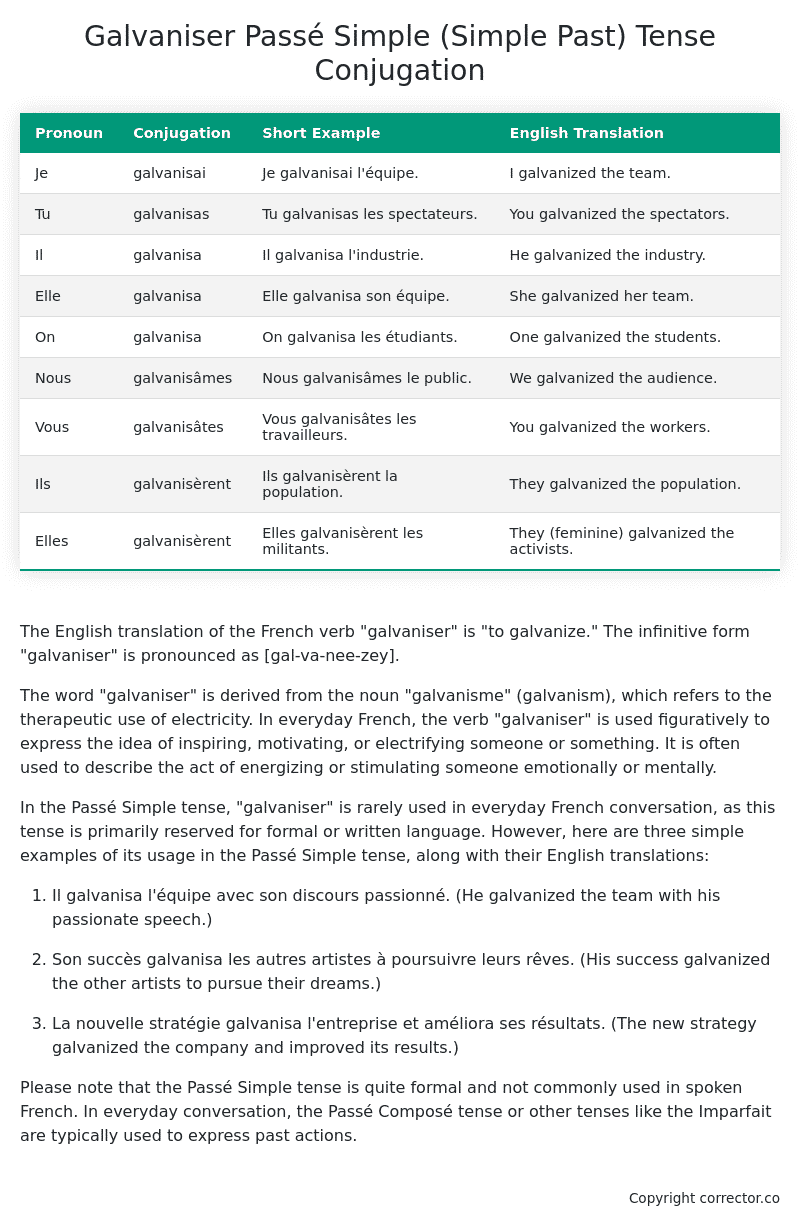Passé Simple (Simple Past) Tense Conjugation of the French Verb galvaniser
Introduction to the verb galvaniser
The English translation of the French verb “galvaniser” is “to galvanize.” The infinitive form “galvaniser” is pronounced as [gal-va-nee-zey].
The word “galvaniser” is derived from the noun “galvanisme” (galvanism), which refers to the therapeutic use of electricity. In everyday French, the verb “galvaniser” is used figuratively to express the idea of inspiring, motivating, or electrifying someone or something. It is often used to describe the act of energizing or stimulating someone emotionally or mentally.
In the Passé Simple tense, “galvaniser” is rarely used in everyday French conversation, as this tense is primarily reserved for formal or written language. However, here are three simple examples of its usage in the Passé Simple tense, along with their English translations:
-
Il galvanisa l’équipe avec son discours passionné.
(He galvanized the team with his passionate speech.) -
Son succès galvanisa les autres artistes à poursuivre leurs rêves.
(His success galvanized the other artists to pursue their dreams.) -
La nouvelle stratégie galvanisa l’entreprise et améliora ses résultats.
(The new strategy galvanized the company and improved its results.)
Please note that the Passé Simple tense is quite formal and not commonly used in spoken French. In everyday conversation, the Passé Composé tense or other tenses like the Imparfait are typically used to express past actions.
Table of the Passé Simple (Simple Past) Tense Conjugation of galvaniser
| Pronoun | Conjugation | Short Example | English Translation |
|---|---|---|---|
| Je | galvanisai | Je galvanisai l’équipe. | I galvanized the team. |
| Tu | galvanisas | Tu galvanisas les spectateurs. | You galvanized the spectators. |
| Il | galvanisa | Il galvanisa l’industrie. | He galvanized the industry. |
| Elle | galvanisa | Elle galvanisa son équipe. | She galvanized her team. |
| On | galvanisa | On galvanisa les étudiants. | One galvanized the students. |
| Nous | galvanisâmes | Nous galvanisâmes le public. | We galvanized the audience. |
| Vous | galvanisâtes | Vous galvanisâtes les travailleurs. | You galvanized the workers. |
| Ils | galvanisèrent | Ils galvanisèrent la population. | They galvanized the population. |
| Elles | galvanisèrent | Elles galvanisèrent les militants. | They (feminine) galvanized the activists. |
Other Conjugations for Galvaniser.
Le Present (Present Tense) Conjugation of the French Verb galvaniser
Imparfait (Imperfect) Tense Conjugation of the French Verb galvaniser
Passé Simple (Simple Past) Tense Conjugation of the French Verb galvaniser (You’re reading it right now!)
Passé Composé (Present Perfect) Tense Conjugation of the French Verb galvaniser
Futur Simple (Simple Future) Tense Conjugation of the French Verb galvaniser
Futur Proche (Near Future) Tense Conjugation of the French Verb galvaniser
Plus-que-parfait (Pluperfect) Tense Conjugation of the French Verb galvaniser
Passé Antérieur (Past Anterior) Tense Conjugation of the French Verb galvaniser
Futur Antérieur (Future Anterior) Tense Conjugation of the French Verb galvaniser
Subjonctif Présent (Subjunctive Present) Tense Conjugation of the French Verb galvaniser
Subjonctif Passé (Subjunctive Past) Tense Conjugation of the French Verb galvaniser
Subjonctif Imparfait (Subjunctive Imperfect) Tense Conjugation of the French Verb galvaniser
Subjonctif Plus-que-parfait (Subjunctive Pluperfect) Tense Conjugation of the French Verb galvaniser
Conditionnel Présent (Conditional Present) Tense Conjugation of the French Verb galvaniser
Conditionnel Passé (Conditional Past) Tense Conjugation of the French Verb galvaniser
Conditionnel Passé II (Conditional Past II) Tense Conjugation of the French Verb galvaniser
L’impératif Présent (Imperative Present) Tense Conjugation of the French Verb galvaniser
L’impératif Passé (Imperative Past) Tense Conjugation of the French Verb galvaniser
L’infinitif Présent (Infinitive Present) Tense Conjugation of the French Verb galvaniser
L’infinitif Passé (Infinitive Past) Tense Conjugation of the French Verb galvaniser
Le Participe Présent (Present Participle) Tense Conjugation of the French Verb galvaniser
Le Participe Passé (Past Participle) Tense Conjugation of the French Verb galvaniser
Struggling with French verbs or the language in general? Why not use our free French Grammar Checker – no registration required!
Get a FREE Download Study Sheet of this Conjugation 🔥
Simply right click the image below, click “save image” and get your free reference for the galvaniser Passé Simple tense conjugation!

Galvaniser – About the French Passé Simple (Simple Past) Tense
Formation
Usage
Narration
Historical Context
Interactions with other tenses
Passé Composé
Imparfait
Conditional and Subjunctive
Summary
I hope you enjoyed this article on the verb galvaniser. Still in a learning mood? Check out another TOTALLY random French verb conjugation!


